Alexander 2.17
Alexander the Great (*356; r. 336-323): the Macedonian king who defeated his Persian colleague Darius III Codomannus and conquered the Achaemenid Empire. During his campaigns, Alexander visited a.o. Egypt, Babylonia, Persis, Media, Bactria, the Punjab, and the valley of the Indus. In the second half of his reign, he had to find a way to rule his newly conquered countries. Therefore, he made Babylon his capital and introduced the oriental court ceremonial, which caused great tensions with his Macedonian and Greek officers.
Civil War
The settlement of Babylon
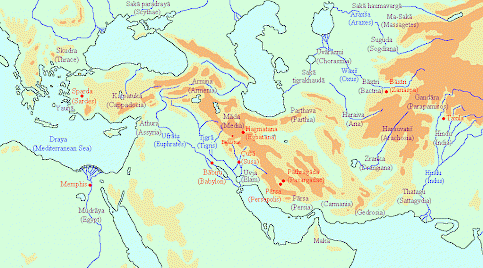
Alexander died in the afternoon of 11 June 323 BCE. Next day, his generals met to discuss the new situation. Under normal circumstances, they, as representatives of the Macedonian nation in arms, were to choose a new king. This could be easy, because the dead king had a brother, Arridaeus. However, he was considered mentally unfit to rule. As a consequence, it was difficult to reach a solution.
According to Quintus Curtius Rufus, Perdiccas, the commander of the Companion cavalry who had been appointed by Alexander as his successor, said that it was best to wait until Roxane, who was pregnant, had given birth. If it were a son, it would be logical to chose him as the new king. This was all too transparent: Perdiccas wanted to be in sole command until the boy had grown up.
Nearchus, the commander of the navy, objected. Alexander was already father of a three year old son, he said, Heracles, the child of his former concubine Barsine. Everyone could see through this proposal: Nearchus was married to a daughter of Barsine, and would, as the future king's brother-in-law, suddenly become very influential. The proposal was not even discussed.
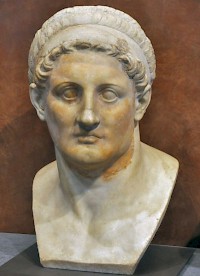
The next speaker was Ptolemy, one of Alexander's personal friends. He objected to the idea that a son of Roxane or Barsine would be king of Macedonia. Those boys were mere half-breeds. His proposal was that the most important decisions were to be taken by those present, as some kind of collective leadership.
To this proposal, the commander of the phalanx, Meleager, objected. Instead, he sided with Arridaeus. He was supported by the foot soldiers, who hated Alexander's oriental policy and preferred Arridaeus, who was not of Persian blood (text).
The situation was tense as it seemed that Meleager's soldiers wanted to fight for Arridaeus against Perdiccas and his adherents. That would mean a war between the infantry and the cavalry (an antagonism already known from the Philotas affair). Although violence was used and Meleager was killed, the cooler heads on both sides improvised a compromise. Perdiccas was to be regent for king Arridaeus and Roxane's son (if the baby were a son, of course). Seeing that this was the only way to prevent civil war, everybody agreed. Arridaeus became king under the name of Philip, Roxane's baby turned out to be a son (Alexander IV), Alexander's second wife Statira was murdered, and Perdiccas appointed the generals as satraps (overview).
The Lamian war
But war had become inevitable. When the Athenians heard that Alexander had died, they revolted (July 323). They had already been preparing the war since the decree on the exiles mentioned above and were joined by many other Greek towns. They occupied Thermopylae, and when the Macedonian commander Antipater arrived, he was repelled and forced to hide in the nearby fortress of Lamia. In the spring of 322, Leonnatus, the satrap of Hellespontine Phrygia, was able to relieve Antipater, although he died in action and the war continued.
In the summer, however, Craterus arrived in Greece. He had been appointed by Alexander as commander in Europe, had been ordered to lead back 11,500 veterans, and had built a navy in Cilicia (to be used when Alexander attacked Carthage). Craterus used the fleet and the veterans, and this meant the end of the war. The Greek cities, which had been free allies during Alexander's reign, were from now on treated as Macedonian subjects. It meant the end of Athenian democracy.
Revolt in the East
At the same time, the veterans who had been forced by Alexander to live in the new cities in the eastern satrapies, decided to fight themselves a way back to Greece. They were defeated by an army commanded by Peithon, the newly appointed satrap of Media (text). For the time being, all remained quiet in the east, but many Europeans had died, and the grip of the survivors on the eastern periphery - not too tight already - became very weak. In 316, the Indian king Chandragupta Maurya could conquer the Punjab.
Into the Vortex
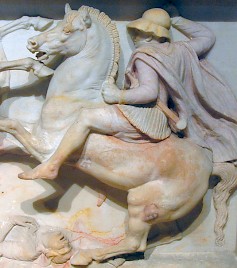
While Peithon, Craterus and Antipater restored order in east and west, Perdiccas himself was occupied in Cappadocia (central Turkey). Alexander had never conquered this country completely, and the last Persian satrap, a man named Ariarathes, had created a kingdom of his own. The Macedonian satrap of Greater Phrygia, Antigonus Monophthalmus ("one eye"), had grown accustomed to defending the road between Macedonia and the east against Ariarathes' attacks. However, when Perdiccas successfully invaded Cappadocia, Antigonus did not appear. It is not known why. What is certain, however, is that when Perdiccas asked him to appear for a military court, Antigonus fled to Antipater's court in Macedonia.
During the last months of 322, civil war broke out between the Macedonians: Craterus and Antipater revolted. Our sources focus on a family conflict. Antipater's daughter Nicaea was engaged with Perdiccas, but the regent broke off the engagement when Alexander's mother Olympias offered him Cleopatra, a full sister of the great king and the widow of king Alexander of Molossis. Antipater felt insulted, and this was, according to our sources, the reason for the civil war.
The truth may be a little bit different. If Perdiccas were to marry a daughter of Philip, their son would be the first in line for succession. After all, Philip Arridaeus was an illegitimate son, and the baby Alexander was a half-breed. Of course, Antipater had good personal reasons to say that he felt insulted, but the real reason for the civil war was only disguised by this argument. What made war inevitable was the growth of Perdiccas' power and the fear which this caused among the other Macedonian leaders - Antipater in the first place, but also Craterus and Antigonus.
And Ptolemy, the satrap of Egypt. He may have planned his independence for a long time, because he had chosen Egypt as his domain, a rich but inaccessible country that could easily be defended. He had already sent his friend Ophellas to the west to conquer the Greek towns of Cyrenaica, in this way covering his back. Seeing that his three former fellow-officers were planning war, he seems deliberately to have provoked a conflict.
In December 322, Perdiccas sent the remains of Alexander to the tomb that had been prepared in Macedonia's religious capital, Aegae. When it had arrived in Damascus, Ptolemy convinced the leader of the convoy that Alexander had wanted to be buried in the temple of his heavenly father Zeus-Ammon. Accordingly, the corpse was brought to Egypt, where it was to find its final resting place in Alexandria. This body-snatching was a provocation and Perdiccas was forced to organize a punitive action.
Civil war
In 321, the rebels cemented their alliance against Perdiccas by intermarriage. Antipater gave his daughters Phila and Eurydice to Craterus and Ptolemy; Nicaea, who had once been promised to Perdiccas, married to Lysimachus, the governor of Thrace. Perdiccas saw that a formidable coalition was being organized. He decided to invade Egypt, and sent Eumenes (Alexander's former secretary and now the satrap of Cappadocia) against the armies of Antipater and Craterus.
Eumenes had no experience as a military commander and had to face Craterus, the best of all Macedonian generals. Nevertheless, he accepted battle (probably somewhere near the Hellespont), and, to everybody's surprise, defeated his opponent. Craterus died fighting; what was left of his army managed to leave the battle field and joined Antipater.
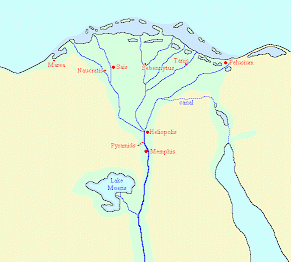
It was May 320 when Perdiccas had reached Egypt. Twice, he tried to cross the Nile near Pelusium, but Ptolemy was able to prevent this. Now, Perdiccas moved to the apex of the Delta, and retried the river crossing in the neighborhood of Heliopolis. However, his men were carried away by the Nile. To all those present, it was obvious that Perdiccas would never invade Egypt, and his soldiers - already resenting his strictness- revolted. Perdiccas sought the advice of his colonels Peithon, the satrap of Media, and Seleucus, the commander of the regiment of the Shield bearers. They, however, decided to kill Perdiccas, to put an end to the civil war.
Triparadisus
Ptolemy and Perdiccas' officers started negotiations. Ptolemy was offered the regency, but he was too smart to take the bait: he wanted to keep what he had won, not risking it in a larger game. He appointed Peithon and an officer named Arridaeus, two people who were clearly lacking prestige and would never be able to stop separatists like Ptolemy.
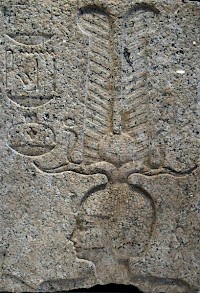
However, Antipater was not happy with arrangement. He wanted to be the new regent, and he was clearly capable of reuniting Alexander's empire. At Triparadisus (perhaps at Baalbek), he settled the affairs in the way he wanted. The most important points of the settlement were:
- Ptolemy was to remain satrap of Egypt;
- Perdiccas' murderer Seleucus was to become satrap of Babylonia;
- the second assassin and former regent, Peithon, was to remain responsible for Media;
- the former regent Arridaeus was the new satrap of Hellespontine Phrygia;
- his ally Antigonus Monophtalmus was reappointed as satrap of Pamphylia, Lycia and Hellespontine Phrygia, to which Lycaonia was added;
- Antigonus was to command Perdiccas' army to expel Eumenes;
- Antipater himself was the new regent and would keep an eye on Roxane, Philip Arridaeus and the young Alexander IV, who were to move to Macedonia.
Having settled all affairs, Antipater and the royal family went to Macedonia. He died in 319.
The Diadochi
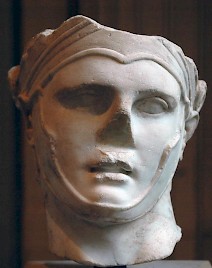
The settlement at Triparadisus meant the end of the united empire. The contours of the future became visible. The independence of Egypt was officially recognized, and Antipater and Antigonus, the commander of the largest armies, had in fact divided Europe and Asia between themselves. The successors of Alexander are called the Diadochi; their story can be found here.
In the years after Triparadisus, Antigonus and his son Demetrius I Poliorcetes tried to reunite Alexander's empire. Their ambitions, however, were frustrated by a coalition of Antipater's son Cassander, Seleucus and Ptolemy. In the Battle of Ipsus (301), Antigonus and Demetrius were defeated. This was the end of the last attempt to reunite the empire.
Seleucus became king of a large empire that was in Antiquity called Asia and by modern scholars the Seleucid Empire. Essentially, this was the former Achaemenid empire, except for Egypt, southern Syria and Palestine, which became the empire of the Ptolemies. The European part of Alexander's empire was still contested, but the winner in Macedonia was Demetrius' son, Antigonus II Gonatas.